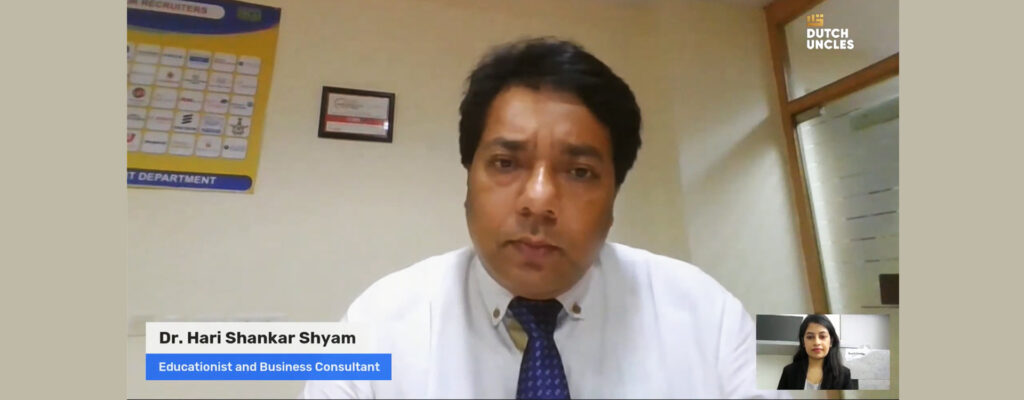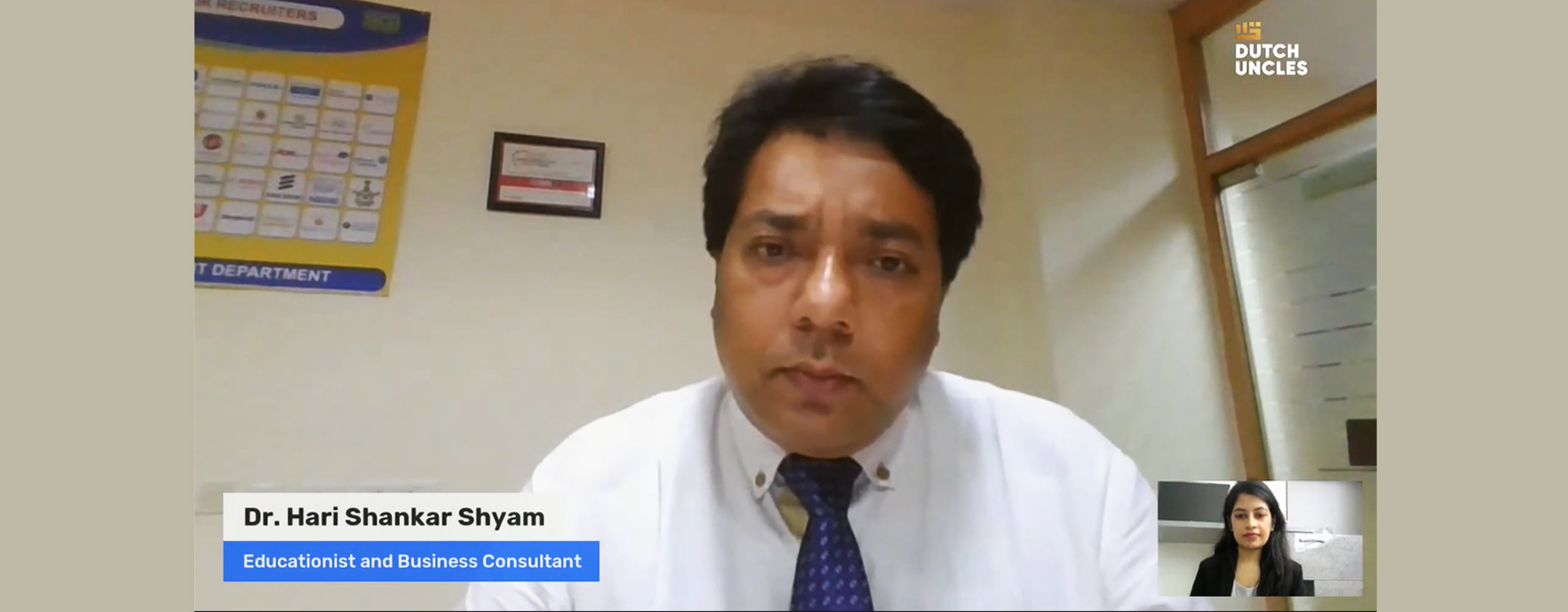Indian youth is oozing out with ideas for businesses and new market concepts. More of them are shifting towards entrepreneurship with the hope to achieve freedom and fulfil their worldly pleasures. The very same reason why India has many start-ups but only a smattering survives. But that doesn’t mean the aspiring start-ups give up, most manage to nurture themselves. 83% of the Indian youth are willing to step into entrepreneurship, the global average being 53%. The number of youths willing to start their business fall between 25 to 34 years of age, followed by the age group 35 to 44.
Dr. Hari Shankar Shyam, a leading educationist and business consultant was the speaker for MentorED, a weekly live 30-minute workshop where industry veterans share their knowledge and experience and discuss topics that are apt and relevant to the start-up and small business fraternity. Dr. Shyam, Educationist and Business Consultant, has counselled more than 10000+ students across the world in his role as start-up mentor. With a Ph.D. in Marketing, an MBA and a Masters in Population Studies, he is currently an Associate Professor of Marketing at Sharda University.
‘‘
Now the question is, why should we not have a dream if the OYO promoter Mr. Agarwal can start at such an early age? It changed the entire hotel and tourism industry of India.
Dr. Hari Shankar Shyam touched on the following points during his thirty-minute workshop which was followed by questions and answers from the live audience:
- Why start-ups can be a good career
- How one can exploit India’s strong IT infrastructure
- How to become agile using digital innovation
- How to get support from government, VC and other sources
Addressing the audience comprising mainly youth entrepreneurs and aspiring business minds, Dr. Shyam shared, “We have realised from the last 15-20 years the word startup was coming. And from the last 10 years, it was THE word in a country like India and today for many youngsters we need not tell, they are already aware, but yes, there are a lot of challenges.” Even during the pandemic, many young entrepreneurs have come forward with solutions to problems with the usage of technology as an intervention. He expressed how the pan-Indian mentality of career orientation has changed from getting a good education in medical or engineering followed by getting a good job to envisioning the idea of a startup during graduation and actualising a startup idea into reality.
In his illustrative presentation, Dr. Shyam talked about the success stories of Indian startups established between 2014 and 2019. Unicorns like OYO Rooms, Snapdeal, Ola Cabs, BYJU’s, Delhivery among others are role models for a young population. “In 2015, there was a Fintech boom. One of the Fintech companies, One97 Communications, came with a brand called PayTM and what wonders it did! Today even if you go anywhere, even a vegetable vendor, you see across even the smallest vendor, they are using PayTM. After the pandemic, it is a revolution.”
“Now the question is, why should we not have a dream if the OYO promoter Mr. Agarwal can start at such an early age? It changed the entire hotel and tourism industry of India.” In a country like India, young minds are inculcating high ambitions and are at a lower risk as compared to one generation prior. With a high motivation, passion and a little craziness to stand out of the crowd, an aspiring startup founder can do wonders. Dr. Shyam also underlined the catalytic role of a mentor as for pursuing a startup dream. A mentor can also be someone from the peer group who has failed in his/her venture, but it is equally important to learn from such an individual so as to not repeat the past mistakes.
“Yesterday was the man of finance, today is the man of marketing and tomorrow is the man of HRD.” Many years ago, only those who had money could think about a business venture but in the present scenario, investors come forward to fund. The years ahead, as Dr. Shyam envisions, are that of technology. India has a strong IT infrastructure and has to be exploited to the fullest. Dr. Shyam stressed on how different cities like Bengaluru, Gurgaon, Noida, Pune, Hyderabad, Kochi have emerged as convenient ecosystems for boosting startups and support opportunities have to be utilised in these cities. Apart from that, there is an easy availability of manpower and technical support aided by a supportive supply chain and digital marketing avenues.
‘‘
Yesterday was the man of finance, today is the man of marketing and tomorrow is the man of HRD.
Audience Asks
How feasible is it to launch a startup in a hi-tech city and start to run it from a small town?
Many of the big cities are having this ecosystem but the smaller ones are not having it. The best part is even though that ecosystem is not there, there is internet connection. There are also many digital tools and platforms, you have to join them. There are also many angel funding communities in Chennai, Mumbai – associate with them and become a member. At the same time, take a mentor and you can really start from a small town. For a big town which is already established, the advantages are much more undoubtedly.
What do you suggest: start a business in a new (untouched) industry or in a tried and tested (already booming) industry?
One thing you need to understand is that we are not competing only with an Indian counterpart. You have to see where the scope is. Startup itself is that your idea is unique and innovative. While deciding which area you have to do, I will not say untried or untested areas. First, you have to find an area, an untested and untried area might be a problem for a newcomer, you need to analyse the situation very well. To begin with, you can enter into an area where some work has already been done. Later on, when a focus will be there, you may take a change in your path.

Dr. Shyam concluded by sharing his experience of being to the best Universities of the world and he has felt that Indian students, with a little awareness and guidance, can rub shoulders with students from across the globe. Though young and talented, Indian youth languish due to low dexterity, indiscipline, sense of responsibility and lack of strategic planning. Despite the failure and shut down rates of start-ups, being an entrepreneur is undoubtedly the current dream and aspiration of the millennials.




